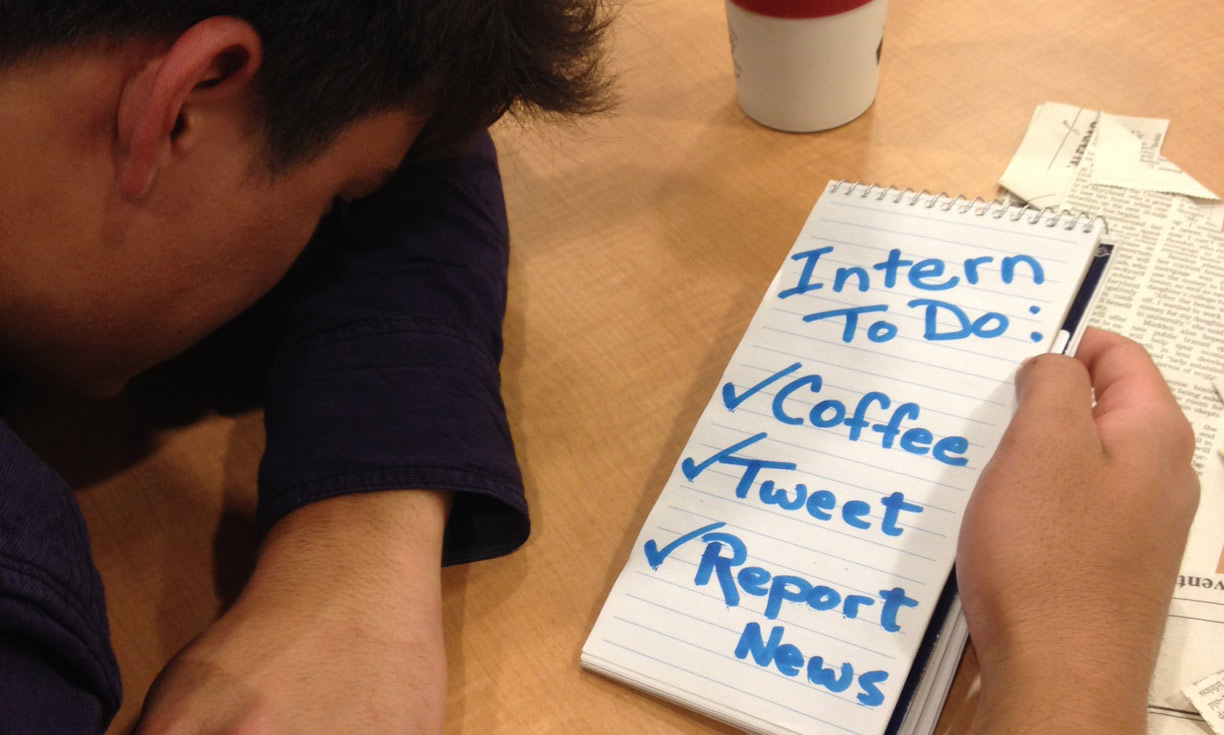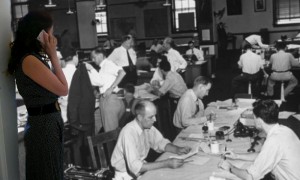It’s a classic intern moment.
Email your source.
Source is not home.
Email again.
Source is actually on a vacation with her daughter in France.
Editor urges you to email again.
Before you know it, you’ve sent what seems like 437 emails and have effectively ruined someone’s peaceful getaway.
This is what happened to Julie Lasson-Fromowitz, intern at the Columbia Journalism Review.
“I was so nervous,” she recalls. “I can’t email someone while they are on vacation.”
But, according to her editor, yes you can. And after some pestering and persistence, she did what needed to be done.
Being an intern, especially in a business in which emailing a potential source on vacation may be one of the least obtrusive things you do, isn’t easy. It takes bravery in the face of failure, persistence amid reluctant sources and busy editors, and enthusiasm — the type of drive that means you show up each day despite knowing your stories may be ripped apart, or worse, spiked.
This enthusiasm, according to Christie Chisholm, associate editor and production editor at the Columbia Journalism Review, is one of the most important things an intern can bring to his or her work, and it is about work — the real work of journalism, not menial tasks.
“It’s so crucial,” she says, “finding a talented young person who is new to a field and is excited to learn.”
AJR talked to eight interns at news organizations ranging from BreakThru radio to The New York Times, and among some of their impressions — they’re terrified of failure; they think newspapers (the actual printed product) are awkward and noisy on a train; and they sometimes struggle for ideas. We boiled it down to the eight things you need to hear from the aspiring journalists of 2014.
Related story: “5 Painful Lessons I Learned as an Intern”
Journalism school is either very valuable and will teach you a lot, or the idea that you have to attend is ‘a load of crap.’
Interns sweating through deadlines in newsrooms this summer disagreed on the value of journalism school.
The perennial argument: Do you learn more in the classroom or in the newsroom?
Gabriel Rosenberg is an intern at Contently, a journalistic storytelling website, and the Columbia Journalism Review. He’s an American studies major at Wesleyan University in Middletown, Conn., and puts it this way:
“The number one biggest load of crap is that you have to go to journalism school.”
A bit harsh perhaps?
Rosenberg says the topics he wants to write about aren’t necessarily taught in J-school. “I want a liberal arts understanding of the world before I write about the world.”
That said, he doesn’t rule out journalism graduate school–a place to get more training before he’s ready to be a professional.
Still, there’s that whole issue of interviewing people.
It’s a skill that takes practice, to really sit down and hear what your source is saying, says Rebecca Seidel, an intern at BreakThru Radio, an independent radio station that broadcasts from New York.
That’s where J-school comes in, she says. The “most important thing” she learned there (she attends Wesleyan University) is how to handle sources.
The stakes are high. And failure can be terrifying.
Did you ever turn in a story to a journalism professor, get an “A” and then just … move on with your life?
Yeah…. it’s not like that in a newsroom.
Your reporting and writing has to be perfect. Factual. Good. And then it gets published for a lot of important people to see.
And if you screw up, it’s not simply your good name you are hurting, points out Felicia Schwartz, an intern in the Wall Street Journal’s D.C. bureau.
“People subscribe to the Journal because they trust it,” says Schwartz, and making a mistake would be violating that trust. “It’s a brand, it’s a reputation,” she says.
Erik Reyna, an intern at The New York Times, put his finger on the real-world pressures that interns sometimes face:
“Failure is the most intimidating thing.”
That fear of screwing up? Well, that can screw things up, too.
Lasson-Fromowitz says she spent so long making sure her first article was flawless that she turned it in late. “I was so intimidated to turn it into the editor,” she says, “that I didn’t make the deadline.”
Social media in the newsroom is different than in the dorm room.
The conventional wisdom is Millennials have got social media down.
All that Snapchatting, hashtagging and Instagramming would make them naturals at promoting news stories for a professional newsroom, right?
Wrong.
Turns out, many interns interviewed say that they are fascinated by the delicate balancing act journalists perform in promoting their content.
“I feel like everyone here is better than I am [at Twitter],” says Schwartz, who received a crash course on how to use social media effectively at the Journal, reflecting her news organization’s social media emphasis. “I’ve been very impressed,” she says.
Trevor Anderson, a copy editing intern at the Wall Street Journal’s New York bureau, says he notices reporters constantly tweeting between writing stories. Anderson says the Wall Street Journal used to even have a large dashboard with Twitter and Tweetdeck up in the newsroom, so everybody could see what’s going on.
[Update: The Wall Street Journal says it still has Twitter and Tweetdeck displayed in the newsroom; “they may just have been off” the day Anderson did the interview with AJR.]
Brad Kronthal, an intern at WJZ-TV out of Baltimore, says his news organization hits the sweet spot, posting quality material often enough to be effective but tastefully enough not to be annoying.
“They tweet out every story,” says Kronthal. “They go out on Facebook, but at the same time, it’s not overwhelming.”
Longform isn’t dead.
Dear longform,
We love you. We learn from you. We aspire to be you. Sincerely, 2014 news interns.
Many interns say they prefer in-depth pieces to the listicles and quick hit traffic-baiters that are infecting the web.
“Within my group of friends we tend to appreciate the level of investigation that goes into more longform pieces,” says Reyna.
Longform, the interns say, has two characteristics that BuzzFeed-style lists rarely achieve: Good storytelling and human interest.
“I think people just want high quality information, written well, that is engaging,” Schwartz says. “I would be hard-pressed to say people only like short stuff.”
As Anderson explains it, it often takes a longer story to accurately portray the human condition.
Profiles, he said, often grab his attention, but any story can have a human element if it’s anchored to real experiences and real people
“People like people stories,” he says.
Enough with all those big inky pages already.
Amid all the questions regarding the future of print, perhaps it would be telling to see what young journalists think about an actual physical product they are producing.
Many of the interns interviewed say newspapers just aren’t portable enough to be practical in this day and age.
“I find it funny that every morning I pick up my paper newspaper and it’s making a ton of noise,” says Fromowitz, referring to the distracting crumpling on crowded public transportation. “I pull out my Kindle, and I’m wondering why I don’t read the newspaper on my Kindle already.”
Rachel Barron, an intern at Washington Parent magazine, has this plea:
“Make publications tablet-friendly.”
She added: “I get magazines on my iPad and I love it. It provides a lot of room for longer articles and more content” instead of folding over big, inky pages.
All the good ideas are taken — well, not really, but good ideas are hard to come by.
How much rejection can one intern take?
Rosenberg put that question to the test, explaining that it took him well over a month before he came up with a story idea that his editor thought was worthy of an article.
One of the hardest parts of being a newsroom intern is the constant pressure to come up with new ideas.
“It’s intimidating to try to find what they [employers] are looking for,” says Rosenberg.
He says the one thing he learned from the process is to keep your head up and be persistent; eventually an idea will stick.
Seidel shares Rosenberg’s angst.
“It’s always a struggle to come up with a list of ideas every week,” she says. “But I’m getting better at it. I’m getting better at recognizing things that would interest a wide audience.”
Newsrooms run at warp speed.
Interns are scrambling to learn how to both be fast and right, explains Anderson.
Lasson-Fromowitz saw how failure on either one of those fronts can have big consequences. She recalls the first story she was assigned to write at Columbia Journalism Review. It was an event she was to cover that started at 9 p.m. She spent the next day laboring over her piece and finally turned it in to her editor by 5 p.m.
That, as it turns out, didn’t cut it.
Spiked.
Lasson-Fromowitz learned that for her story to be relevant, it needed to be published by 11 a.m. the day after the night meeting.
Reyna, at The New York Times, says, “everything here works fast.”
Despite such pressures, employees are usually friendly and willing to help interns, says Reyna.
“You can always go up to people and they’ll take the time to walk you through something if you don’t get it.”
Don’t give up. Even if someone calls you a garbage idiot.
This article would not be complete without a thought or two from the author – that would be me. I am, after all, an intern myself, for American Journalism Review.
A couple weeks ago I wrote a story about Gawker’s commenting platform, Kinja.
It was torn apart by Gawker users, some who complained I didn’t fully grasp the online community that I was covering.
A Gawker writer even called me a “garbage idiot.”
And at the time, it hurt to have so many insults thrown my way. I wanted to curl up under the covers and pretend the mean people of the Internet didn’t exist.
But I couldn’t do that.
What I learned from this is that you have to keep writing. Bad things are going to happen. You’re going to miss deadlines, you’re going to have to call people on vacation, you’re going to be called a garbage idiot and laughed at. But you have to keep going. Stay hungry, stay ambitious, pick yourself up, and keep writing. Because at the end of the day, it’s our job, it’s what we love, it’s what we were meant to do.
To all newsroom interns who may feel humiliated or dejected or worthless, I say to you this: above all, keep writing, keep writing, keep writing.
Editor’s note: This story has been updated to include the correct school for Rebecca Seidel, which is Wesleyan University. Julie Lasson-Fromowitz’s name was also corrected.

















Leave a Comment